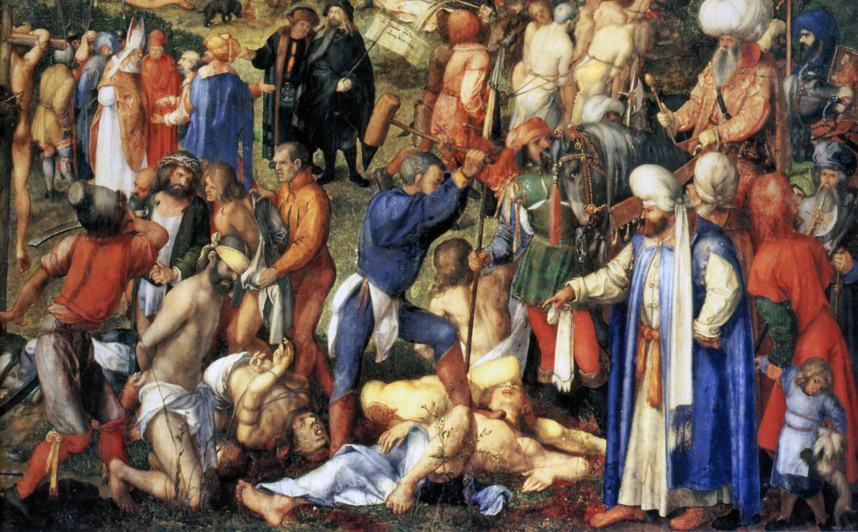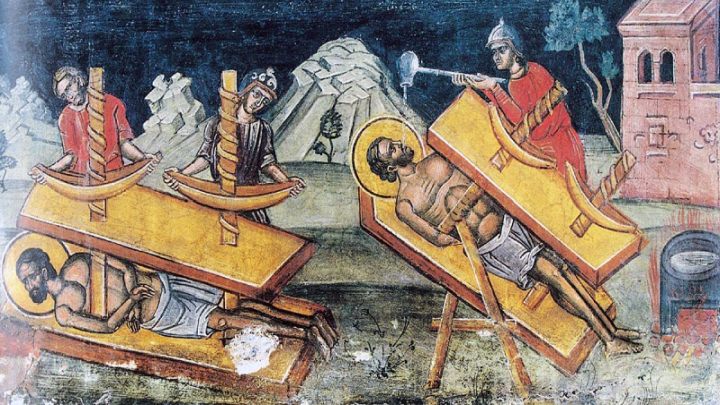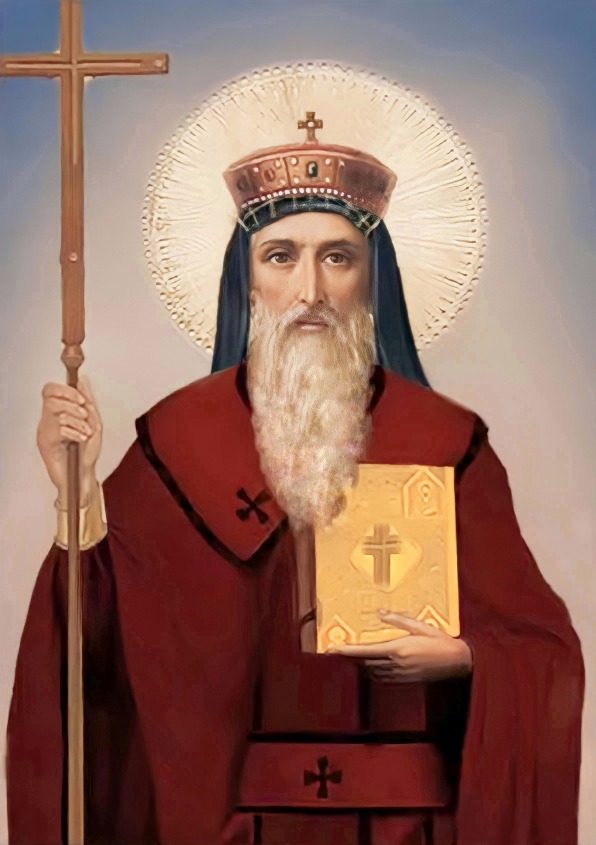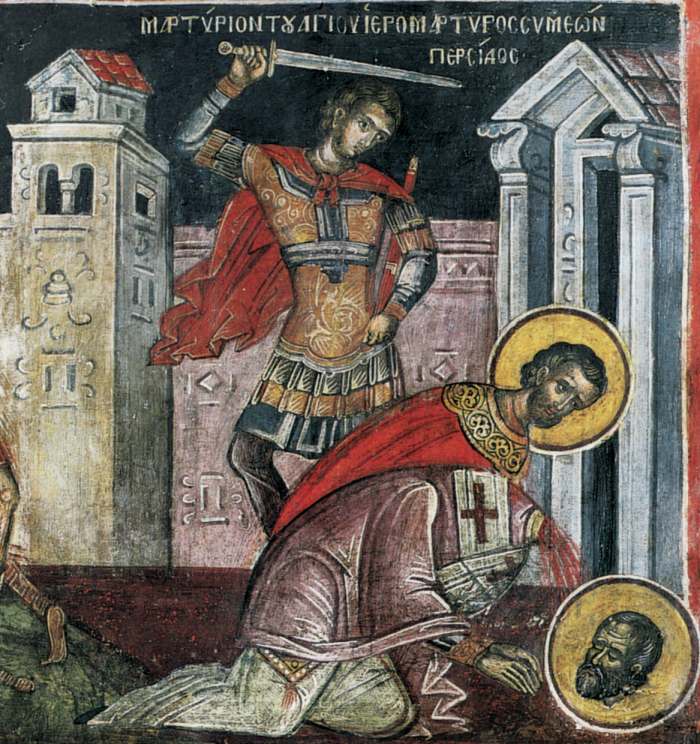
This holy primate of the Church of Persia was its most illustrious champion in the great persecution of King Sapor II, surnamed the Long-lived.
The haughtiness of this prince appears from his letter to Constantine the Great, in which he styles himself king of kings, partner with the stars, brother of the sun and moon, and says:
That whereas in valor and virtue he surpassed all his predecessors, he ought to have demanded the largest extent of empire that any of them possessed. Nevertheless,
though their dominions had formerly reached as far as Macedonia, he contented himself with insisting only on the restitution of the eastern parts, which had been usurped by the Romans.
Indeed, he had been saturated with this pride from his infancy, for when his father King Hormisdas died, he was still in his mother's womb. The leading men of the country
placed the regal crown upon her body – thus, Sapor II was literally born king, in 310, and reigned 70 years.
It was as much out of hatred of the Roman name, as of the Christian Faith, that this haughty tyrant vented his rage on the Christians of his empire in three bloody persecutions. The first he raised in the eighteenth year of his reign, 327, in which were crowned Ss. Jonas, Barachisius and others (see second image below), mentioned in the Martyrology on March 29; the second in his thirtieth year in which died Ss. Sapor, Isaac, and Companions – November 30; and the third, of all the most cruel, in his thirty-first year. This was continued with the utmost rage during the last 40 years of his life. Sozomen writes that the names of sixteen thousand who were crowned by it were upon record; but adds, with St. Maruthas that those whose names were not known on earth were innumerable (a historian of the 10th century claims that 200,000 died; image below). Of these Martyrs, St. Simeon and his Companions were the most illustrious.

St. Simeon was surnamed Barsabae, signifying the son of a fuller, from the trade of his father, according to the custom of the East. He was a disciple of Papa, Bishop of Ctesiphon, and by him was made his coadjutor Bishop in 314. He continued as Bishop there after Papa's death in 327 or 328. The Council of Nicaea (325) had declared the Bishop of Seleucia-Ctesiphon to be the Metropolitan (Archbishop) of all Persia, which happened in St. Simeon's time – for he assisted at that Council, not in person, but by his delegate, who later succeeded him.
In 340 King Sapor, resolving to abolish the Christian religion, decreed that whoever would embrace it would be made a slave, and he oppressed the Christians with
unsupportable taxes. St. Simeon wrote to him a letter, with that courage which nothing but a truly apostolic spirit could dictate. And to the threats of the king against him
and his people, he answered: As Jesus willingly offered Himself to death for the whole world, and by dying redeemed it, why should I be afraid to lay down my life for the people,
with the care of whose salvation I am charged? I desire not to live, unless I may continue unspotted and undefiled. God forbid that I should purchase life at the hazard of those
souls for which Jesus died. I am not so slothful as to fear to walk in His steps, to tread the path of His Passion, and to share in the communion of His sacrifice.
As to your threats against my people, they are not lacking the courage to die for their salvation.
The king, receiving this answer, trembled with wrath, and immediately dictated a decree, commanding all priests and deacons to be put to death,
the churches to be levelled to the ground, and the sacred vessels to be seized and put to profane use. He added: And let Simeon, the leader of wicked men,
who despises my royal majesty, worships only the God of Caesar (Constantine), and despises my divinity, be brought and arraigned before me.
The Jews, natural enemies to the Christians, seeing the circumstances favorable to their malice, said to Sapor (to encourage his wrath): If you, O King, write to Caesar,
he will take no notice of your letter; but at a poor line from Simeon, he will arise, adore, and embrace it with both hands, and command all things contained in it to be
instantly put into execution.
St. Simeon, pursuant to the king's orders, was apprehended and bound in chains with two of the twelve priests of his church – Abdechalas and Ananias.
As he was led through his native city of Susan, he begged he might not have to pass by a great Christian church recently converted into a Jewish synagogue,
lest the very sight should make him fall into a swoon. Being hurried on by the guards in great haste, they made the long journey to Sapor in just a few days.
Appearing before the king, the holy Bishop refused to "adore" him (i.e., to prostrate before him after the custom of the Persians). Sapor asked why he did not adore him
as he had formerly been accustomed to do. St. Simeon answered: Because I was never before brought to you bound, and with the view of compelling me to deny the true God.

Saints Jonas and Barachisius
The king's counsellors were of the sect of the Magians – pagan philosophers much given to astronomy and divination. Some of them had performed the
pre-birth coronation ceremony, and so had remained in the king's favor. They now told the king that St. Simeon should be put to death as a conspirator against his throne.
The Saint said to them: Impious men, are you not content in having corrupted the kingdom? Must you endeavor to draw us Christians also into your wickedness?
The king, then putting on a milder countenance, said: Simeon, take my advice, who wish you well. Adore the deity of the sun; nothing can be more for your own
and your whole people's advantage.
St. Simeon answered: I would not adore you, O King; and you far exceed the sun, being endued with reason. We Christians have no Lord
but Christ, Who was crucified.
If you adored a living God,
said the king, I would excuse your folly; but you give the title of God to a Man Who expired on an ignominious tree.
Lay aside that madness and adore the sun, by whose divinity all things subsist. If you do this, riches, honors, and the greatest dignities of my kingdom shall be yours.
The Saint replied: That sun mourned at the death of Christ its Lord and the Creator of men, Who rose again glorious, and ascended into Heaven. Your honors tempt not me,
who know much greater are prepared for me in Heaven, with which you are not acquainted.
The king said: Spare your own life, and the lives of an infinite multitude,
who, I am resolved, shall die, if you are obstinate.
Simeon boldly answered: Were you to commit such a crime, you would find cause to repent of it on the day when
you will be called upon to give an account of all your actions; you will then know the heinousness of your offense – I resign to your pleasure this miserable short life.
 Then the king said:
Then the king said: Though you have no compassion for yourself, I pity at least your followers, and will endeavor to cure them of their folly, by the severity
of your punishment.
The Saint answered: You will learn by experience that Christians will not lose their lives in God, for the sake of living here with you;
nor would we exchange the eternal name we have received from Christ, for the diadem which you wear.
The king threatened: If you will not honor me before my nobles,
nor adore me with this sun, the deity of all the East, I will tomorrow cause the beauty of your face, and the venerable comeliness of your body, to be disfigured by blows,
and stained with your blood.
Simeon replied: You make the sun and yourself equally gods; but you are greater than the sun. If you disfigure this body,
it has a Repairer Who will raise it up again, and restore with interest this beauty which He created, and which is now despicable.
It is remarked that St. Simeon was
exceedingly comely in his person, and venerable and graceful in his aspect (image left).
There sat at the palace gate, as St. Simeon was led through it, an old nobleman, in the highest favor with the king, who had been trained up by him from his infancy.
He was one of the first noblemen in the whole kingdom – the lord high chamberlain. (The Roman Martyrology calls him Usthazanes. Fr. Butler, along with Sozomen,
refers to him as a eunuch, also known as Guhsciatazades. He is not to be confused with another eunuch named Azades, whom the Martyrology maintains suffered martyrdom,
with many others, on April 22 of the following year.) He was a Christian, but fearing his master's displeasure, had some time before publicly adored the sun.
This minister, seeing the Saint pass by as he was led back to prison, rose up and prostrated before him. But the Bishop, having been informed that he had been guilty of an
outward act of idolatry, reprimanded him sharply for it and turned away. This touched the old man to the quick, who entering into a sense of the enormity of his crime,
burst into loud cries and many tears, filling the court with his lamentations, saying to himself: If Simeon's aversion and rebuke be so grievous to me, how shall I be able
to bear the anger and indignation of God, Whom I have basely denied?
Whereupon, hastening home, he threw off his rich garments and put on black for mourning, according to he Persian custom. In this dress he returned, and sat in grief in his usual place
at the palace gate. The king, being informed of it, sent to enquire why he mourned, whilst his sovereign enjoyed his crown and health. He answered that it was for a double fault –
the renouncing of the true God by adoring the sun, and the deceiving of the emperor, by an insincere act of worship, acting therein contrary to the dictates of his reason and conscience.
The king, enraged thereat, said: I will soon rid you of this mad grief, if you remain obstinate in your present opinion.
Usthazanes replied: I call to witness the Lord of Heaven and earth,
that I will never more obey you in this, nor repeat that of which I heartily repent. I am a Christian, and I will never more be guilty of so base a perfidy against the true God to please man.
The king replied: I pity your old age: I grieve to think you should lose the merit of your long services to my father and myself. I beg you, lay aside the opinion of wicked men,
that you may not perish together with them.
The minister answered: Know, O King, that I will never abandon God and pay divine worship to creatures.
Do I then worship creatures?
asked the king.
Yes,
said the nobleman, even creatures destitute of reason and life.
Hereupon the king commanded him to be put to the torture, but at the request of the nobility changed his mind, and gave orders for his immediate execution. As he was led out to be beheaded he sent a faithful eunuch to the king, begging, as the last and only favor for all his past services, that a crier might proclaim before him, that he was not put to death for any crime, but purely for being a Christian. This he desired that he might repair the scandal which his apostasy had given. The king more readily assented to the proposal, because he thought it would more effectually deter his subjects from a religion, which he punished with death even in a faithful domestic, and a kind of foster-father; not considering how much so great an example would encourage them. The holy old man was beheaded on Holy Thursday.
 St. Simeon, being informed in his dungeon of the martyrdom of Usthazanes, gave most hearty thanks to God for his triumph, and earnestly begged his own might be hastened, crying out:
St. Simeon, being informed in his dungeon of the martyrdom of Usthazanes, gave most hearty thanks to God for his triumph, and earnestly begged his own might be hastened, crying out:
O happy day, which will call me to execution! It will free me from all dangers and miseries, and present me with my long desired crown; it will end all my sorrows and wipe away all my tears.
Whilst he poured forth his souls in languishing sighs and long prayer, with his hands lifted up to Heaven, the two priests who had been apprehended with him saw and admired his countenance
most beautiful and shining, expressing the inner joy of his soul, and his longing hopes and desires. The Saint spent Holy Thursday night in prayer, crying out: Hear me, O Jesus, though I am most undeserving
and unworthy; grant that I may drink this chalice on the day and at the hour of Thy Passion. May all know that Simeon was obedient to the Lord and was sacrificed with Him.
St. Simeon being brought to judgment the next day, it being Good Friday, and refusing as before to adore the king, he said to him: Simeon, what is the result of last night's deliberation?
Do you accept of my mercy, or do you persist in disobeying me, and choose death? Adore the sun but this once, and never adore it again, unless you please. On that condition, I offer you liberty, security,
and protection.
The Saint replied: I will never be guilty of such a crime and scandal.
The king said: I call to remembrance our former friendship, on which account I wished you well,
and have given you signal proofs of my lenience; but you contemn my benevolence. Impute therefore all to yourself.
St. Simeon said: Flatter me not; why am I not speedily sacrificed?
The happy hour of my banquet calls me.
The king, turning to his noblemen, said: Behold the wonderful dignity of his countenance, and the venerable majesty of his person. I have seen many countries, but never beheld so graceful a face,
and such comely limbs. You see the madness of the man; he is obstinately bent on dying for his error.
They all answered him: O King, your wisdom cannot so much admire the beauty of his body,
as not to regard more the minds which he has corrupted.
Then the king condemned him to be beheaded, and he was immediately conducted to execution. A hundred other Christians were led out to suffer with him: among whom were five Bishops,
some priests and deacons, the rest of the inferior clergy. The chief judge said to them: If any one of you will adore the sun, the great god, let him step forth; his life shall be granted him.
But not one of them accepted life at this price, all crying out: Our faith in God teaches us to contemn your torments; your swords cannot cut off our firm hopes of our resurrection.
We will never adore your pretended deity.
The officers accordingly began to execute them, while St. Simeon, standing in their midst, continued exhorting them to constancy in the assured hope of a happy resurrection.
After the hundred were beheaded, St. Simeon himself received the stroke of the axe, together with his two companions, Ss. Abdechalas and Ananias. The latter, as he was putting off his clothes,
was seized with a violent but involuntary trembling; which being observed by Pusicius, who had been a few days before created prefect of all the king's workmen, cried out: Ananias, banish all fear!
Shut your eyes one moment, and you will behold the light of Christ!
He had no sooner said this, than he himself was seized and brought before the king, who reproached him as ungrateful for the honor so
recently bestowed upon him. Pusicius answered: I could desire to exchange my life for their faith. I renounce this your honor, with all its cares and trouble, and beg their death,
than which nothing can be more happy.
Then the king said: Do you despise your dignity and prefer death? Are you a lunatic?
Pusicius replied: I am a Christian; and by a most certain hope in God,
I prefer their death to your honors.
The king being enraged, said to his attendants: This man must not die by any common death;
and commanded that the back of his neck should be cut through all the way to his mouth,
and his tongue be plucked out from the roots through the wound. This was executed with extreme cruelty, and St. Pusicius expired the same hour. He had a daughter who had consecrated her virginity to God.
She also was apprehended and crowned with no less glorious a martyrdom.
Fr. Butler gives April 17, 341 as the date of the martyrdom of St. Simeon, along with the Greek church (although some give 344 or 345 as the year). The Roman Martyrology, however, assigns his feast, along with his companions in martyrdom, to April 21.
Alphabetical Index; Calendar List of Saints
Contact us: smr@salvemariaregina.info
Visit also: www.marienfried.com